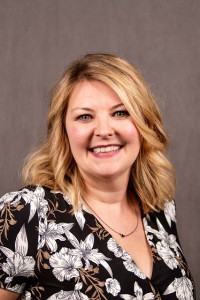Candidate for Secretary
Nicole A. Bannister
Clemson University
Associate Professor

Participation in AMTE and/or AMTE Affiliates(s)
I have been a member of AMTE for the last 5 years and am eager to become more involved in the organization. I have also been a member of AMTE affiliate SCAMTE, the South Carolina Association of Math Teacher Educators (2015-2017). I have regularly attended conferences, both as a participant and a presenter, and frequently collaborate with other AMTE members on research, teaching, and service-oriented activities. I was a STaR Fellow in 2014-2015.
I am deeply committed to the mission, goals, and priorities of AMTE, both as a researcher and as a mathematics teacher educator, and would like to contribute to the continued growth and strength of the organization through the Secretary role.
Participation in Related Organizations
I am an active member of NCTM (since 1998), PME-NA (since 2005), AERA (since 2009), ISLS (since 2013), and TODOS (since 2018). I have participated in these organizations by attending conferences as a participant and presenter, reviewing conference proposals, reviewing manuscripts for organization publication venues, collaborating with organization members, serving on committees, and engaging with organizational communities and resources. I served on the 2019 NCTM Annual Meeting Program Committee (San Diego, CA), as well as on the 2018 PME-NA Local Organizing Committee (Greenville, SC). I also served as an appointed member of the 2016 NCTM Committee Review of AMTE Mathematics Teacher Preparation Standards. I found this work very rewarding, as it provided me with significant opportunities to study and reflect upon the Standards with an amazing group of Mathematics Teacher Educators.
Qualifications for the Position
My professional background includes research on collaborative mathematics teacher learning, professional development, grant management, and secondary and higher education teaching. These experiences have sharpened my skills at project management, communication, organization, detailed record keeping, and maintaining and securing archival data. I have learned how to prioritize the multiple layers of complex tasks involving the coordination of large groups of people in various roles and locations and complete time-sensitive tasks efficiently and sensibly. In particular, writing ethnographic fieldnotes for the past 15 years has strengthened my ability to tune in to, capture, and archive the essential information and important decisions that emerge from workgroup conversations. I am excited by the opportunity to apply my strengths within the AMTE Secretary role in ways that support the continued strength and growth of the organization.
Three Goals AMTE should make a Priority
1. Organize, frame, and unify AMTE’s focus around equity and social justice. Issues of equity and social justice are at play in every classroom interaction and activity. All the time. As a leading voice in mathematics teacher education, AMTE has a responsibility to interrogate and model ways for meaningfully situating our work within these broader contexts.
2. Support development of and continued collaboration among MTE communities of practice. Research supports a positive relationship between teacher participation in collaborative communities that are organized for advancement and equitable learning environments for students. It stands to reason that this research applies to MTEs, including peer observation and co-planning activities, although time constraints and distances between MTEs often constrain widespread teaching-focused collaborations and related research efforts.
3. Commit to understanding how AMTE’s Standards for Preparing Teachers of Mathematics align with – or don’t – current and widespread practices and policies in K12 classrooms, schools, and districts. This is not to say that the Standards should align with these trends, but instead functions to catalyze broader conversations on the modern learning needs of prospective and in-service teachers in context of complex pressures and demands of contemporary teaching environments, and to challenge us to adapt our own practices in light of what we learn.
Additional Information
As a mathematics teacher educator and learning scientist, my everyday work centers on conducting research, teaching, and engaging in service activities that parallel AMTE’s improvement-oriented mission for K-12 mathematics teacher education.
I study and support mathematics teachers to learn practices that draw on students’ assumed strengths and challenge deficit-based thinking. I theorize my research socially, specifically focusing on communities of practice as robust setting for learning and frame analysis methods for analyzing teacher understandings of the student experience over time. By interpreting learning as a process of becoming a member of a community that involves transformation of both of person and social world, my work contributed the first known empirical example of within-group teacher learning using social theories of learning. Just as in-service teachers need the support and resources of the professional community to learn, I have found that prospective teachers and graduate students need course activities and mentoring experiences framed in collaborative inquiry that approximate the work of teaching and of academia. My professional service activities not only reify my commitments to strengths-based teaching and engaged participation in communities of practice, but also function to advance my own scholarly development, offering sustained opportunities to expand my knowledge base by reviewing scholarship in multiple disciplinary areas, to connect to everyday practice through partnership with in-service teachers in PD activities, and to support the growth and development of the professional organizations through conference and other organizational activities.
If elected, the aforementioned strengths and multiple areas of expertise that I bring to the Secretary position would help to support a diverse and well-rounded AMTE leadership team.
